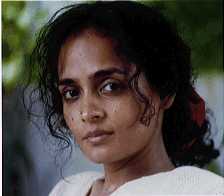| the-south-asian.com SEPTEMBER 2001 | ||
| about us contact us data bank past issues the craft shop the print gallery | ||
|
SEPTEMBER 2001 Contents Interview Heritage Cultural Heritage of south Asia People Communities Lifestyle Films Editor's Note
Books
|
Page 3 of 6 Arundhati Roy interviewed by David Barsamian (continued)
"I think fiction is the truest thing there ever was. My whole effort now is to remove that distinction. The writer is the midwife of understanding. It's very important for me to tell politics like a story, to make it real, to draw a link between a man with his child and what fruit he had in the village he lived in before he was kicked out, and how that relates to Mr. Wolfensohn at the World Bank." Q: Since you wrote your novel, you've produced some remarkable political essays. What was that transition like?Roy: It's only to people in the outside world, who got to know me after The God of Small Things, that it seems like a transition. In fact, I'd written political essays before I wrote the novel. I wrote a series of essays called "The Great Indian Rape Trick" about a woman named Phoolan Devi, and the way the film Bandit Queen exploited her, and whether or not somebody should have the right to restage the rape of a living woman without her consent. There are issues I've been involved with for a while. I don't see a great difference between The God of Small Things and my works of nonfiction. As I keep saying, fiction is truth. I think fiction is the truest thing there ever was. My whole effort now is to remove that distinction. The writer is the midwife of understanding. It's very important for me to tell politics like a story, to make it real, to draw a link between a man with his child and what fruit he had in the village he lived in before he was kicked out, and how that relates to Mr. Wolfensohn at the World Bank. That's what I want to do. The God of Small Things is a book where you connect the very smallest things to the very biggest - whether it's the dent that a baby spider makes on the surface of water or the quality of the moonlight on a river or how history and politics intrude into your life, your house, your bedroom.Q: Estha, one of the main characters in your novel, is walking "along the banks of the river that smelled of shit and pesticides bought by World Bank loans." The World Bank scheme for the Narmada River Valley envisioned the construction of more than 3,000 dams. The bank has since withdrawn from the project, and the government of India has taken it over. Tell me about the Narmada Bachao Andolan, the NBA.Roy: When I first met people from the NBA, they told me, "We knew that you would be against the dams and the World Bank when we read The God of Small Things." The remarkable thing about the NBA is that it is a cross-section of India. It is a coalition of Adivasis [India's indigenous people], upper-caste big farmers, the Dalits [formerly known as Untouchables], and the middle class. It's a forging of links between the urban and the rural, between the farmers and the fishermen and the writers and the painters. That's what gives it its phenomenal strength, and it's what a lot of people criticize it for in India, saying, you know, these middle class protesters! That makes me furious. The middle class urban engineers are the people who came up with this project! You can't expect the critique to be just Adivasi. You isolate them like that, and it's so easy to crush them. In many ways, people try to delegitimize the involvement of the middle class, saying, how can you speak on behalf of these people? No one is speaking on behalf of anyone. The point is that the NBA is a fantastic example of people linking hands across caste and class. It is the biggest, finest, most magnificent resistance movement since the independence struggle.Q: One protest you were involved in last year took place at a village on the banks of the Narmada at the site of one of the proposed dams. You were among many who were arrested there. What was that like?Roy: It was absolutely fantastic. I was in a village called Sulgaon. All night, all over the valley, people started arriving, by tractor, by motorcar, by foot. By three in the morning there were about 5,000 of us. We started walking in the dark to the dam site. The police already knew that the dam site would be captured, but they didn't know from where the people would come. There's a huge area of devastation there. So we walked in the dark. It was amazing. Five thousand people, mostly villagers, but also people from the cities--lawyers, architects, journalists--walking through these byways and crossing streams in absolute silence. There was not a person that lit a bidi or coughed or cleared their throats. Occasionally, a whole group of women would sit down and pee and then keep walking. Finally, at dawn, we arrived and took over the dam site. For hours, the police surrounded us. Then there was a baton charge. They arrested thousands of people, including me. The jails were full.
Copyright © 2000 - 2001 [the-south-asian.com]. Intellectual Property. All rights reserved. |
|
